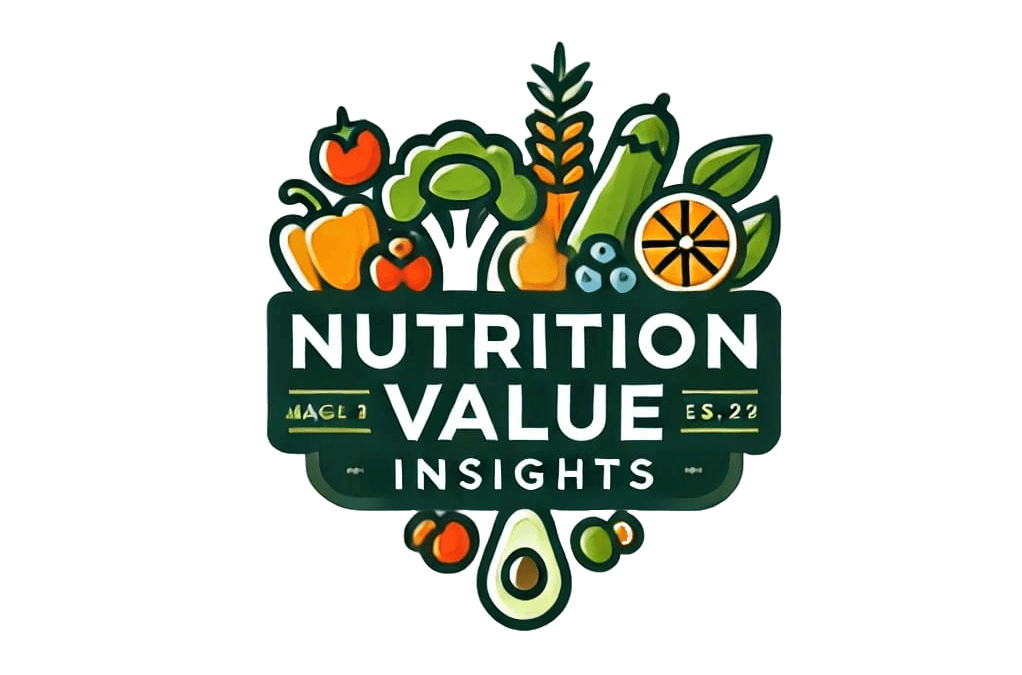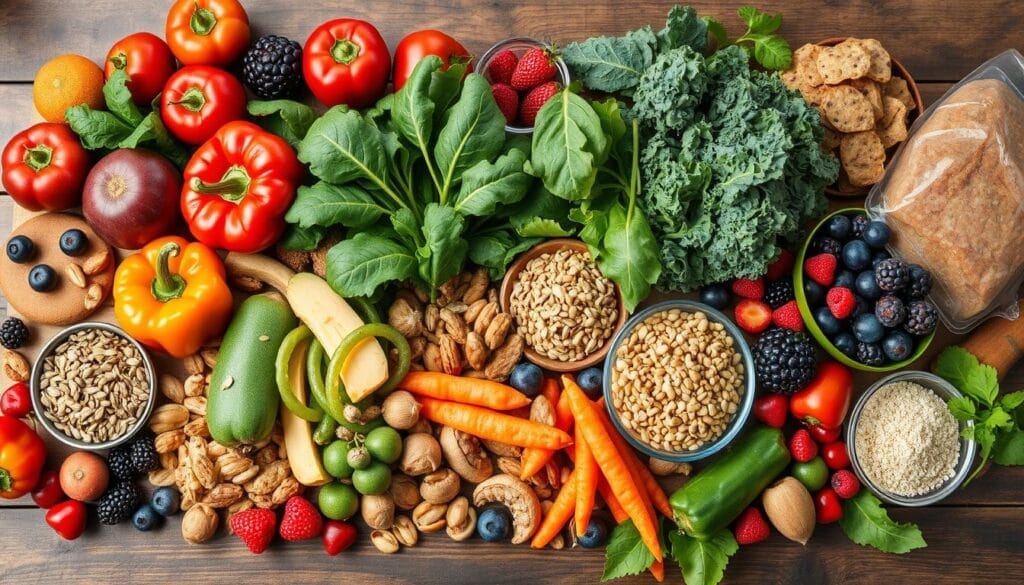The Best Nutrient-Dense Foods to Boost Your Health: A Complete Guide
Discover the secrets to better health and wellness with nutrient-dense foods. This guide will show you many whole, unprocessed foods full of vitamins, minerals, and more. These “superfoods” can help you feel more energetic, support your brain, and keep your diet balanced info nutrition.
You’ll learn about foods like leafy greens, omega-3 fish, high-protein foods, and fruits full of antioxidants. These foods are packed with nutrients that can boost your health and happiness. Adding them to your meals can nourish your body and bring many benefits to your life.

Table of Contents
What are Nutrient-Dense Foods?
Nutrient-dense foods are the powerhouses of the culinary world. They pack a nutritional punch, offering vitamins, minerals, and more. Unlike “empty calorie” foods, they nourish your body deeply, supporting health and well-being.
Understanding Nutrient Density
Nutrient density measures a food’s nutrient concentration. Foods high in nutrients have a lot of good stuff for their calories. These are usually whole, unprocessed items like fruits, veggies, whole grains, lean proteins, and healthy fats.
The Importance of Nutrient-Rich Diets
Having a nutrient-rich diet is key for good health and energy. Eating a mix of nutrient-dense whole foods gives your body what it needs. This boosts your immune system, brain function, and skin health, among other benefits.
Adding a variety of nutrient-dense foods to your meals brings the whole foods benefits of a balanced diet essentials. It fuels your body with the nutrient density it needs.
“Eating a nutrient-dense diet is one of the best things you can do for your overall health and well-being.”
The Best Nutrient-Dense Foods for a Balanced Diet
Selecting the right foods is essential for a healthy lifestyle. Nutrient-dense options provide your body with the vitamins and minerals it requires.. Let’s look at the best foods to add to your diet.
Leafy green vegetables are a top choice. Spinach, kale, and Swiss chard are full of vitamins A, C, and K. They also have iron and calcium. These foods are low in calories but high in fiber, helping with digestion and keeping you full.
Fatty fish like salmon, mackerel, and sardines are also important. They’re full of omega-3 fatty acids. These are good for your brain, heart, and help reduce inflammation. Since our bodies can’t make omega-3s, we need to get them from food.
- Leafy greens (spinach, kale, Swiss chard)
- Fatty fish (salmon, mackerel, sardines)
- Berries (blueberries, raspberries, strawberries)
- Nuts and seeds (almonds, walnuts, chia seeds)
- Legumes (lentils, chickpeas, black beans)
Berries, nuts and seeds, and legumes are also superfoods. Berries are full of antioxidants and fiber. Nuts and seeds provide healthy fats, protein, and essential vitamins. Legumes are great for plant-based protein and fiber.
“Nutrient-dense foods are the foundation of a healthy, balanced diet. By incorporating a variety of these superfoods into your meals, you’ll be nourishing your body with the essential nutrients it needs to function at its best.”

Focus on whole, unprocessed foods for a balanced diet. By choosing nutrient-dense foods, you support your health and wellbeing.
Leafy Greens: Powerhouses of Nutrition
Leafy greens are true superfoods, packed with nutrients. They include spinach, kale, and Swiss chard. These greens are full of vitamins, minerals, and antioxidants that boost your health.
Spinach, Kale, and Swiss Chard
Spinach, kale, and Swiss chard are top leafy greens. Each offers unique nutrients that benefit your body.
- Spinach is packed with vitamins A, C, and K, as well as minerals such as iron and magnesium. It’s great for a healthy immune system and strong bones.
- Kale is a nutrient powerhouse. It has vitamins A, C, and K, and minerals like calcium and potassium. Its fiber supports digestion.
- Swiss chard is versatile and nutritious. It’s full of vitamins A, C, and K, and minerals like magnesium and iron. It’s good for heart health.
Nutrient Profiles and Health Benefits
Leafy greens such as spinach, kale, and Swiss chard are considered superfoods. They are loaded with nutrients and provide numerous health benefits. They support immune function, digestion, heart health, and reduce inflammation.
| Nutrient | Spinach | Kale | Swiss Chard |
|---|---|---|---|
| Vitamin A | 377% DV | 206% DV | 214% DV |
| Vitamin C | 56% DV | 134% DV | 50% DV |
| Vitamin K | 181% DV | 684% DV | 716% DV |
| Magnesium | 39% DV | 12% DV | 38% DV |
| Iron | 15% DV | 6% DV | 21% DV |
Eating these leafy greens gives your body essential nutrients. They support overall health and lower the risk of chronic diseases.
Omega-3 Rich Foods for Brain Health
Omega-3 fatty acids are essential for maintaining a healthy brain. They help with thinking, memory, and brain health. Many foods are full of omega-3s, making it simple to eat them.
Fatty fish like salmon, mackerel, sardines, and tuna are great sources. They’re not just good for your brain but also for your heart. Eating two to three servings a week can really help your brain.
If you like plant-based foods, try walnuts, chia seeds, and flaxseeds. They’re easy to add to your meals. You can sprinkle them on salads or mix them into yogurt.
Eating foods rich in omega-3s can make your brain healthier. Start making small changes to your diet. Soon, you’ll notice better thinking and overall health.

“A diet rich in omega-3 fatty acids can help maintain brain health and cognitive function as we age.”
High-Protein Sources for Muscle and Energy
Adding high-protein foods to your diet can change your muscle health and energy. These foods are great for athletes, fitness lovers, or anyone wanting a balanced life. They help improve your overall health.
Lean Meats, Fish, and Plant-Based Options
Lean meats, fish, and plant-based proteins are key for muscle and energy. Chicken, beef, salmon, and tuna are full of amino acids your muscles need. They help repair and grow your muscles.
Plant-based diets have many tasty, protein-rich foods. You can enjoy:
- Tofu and tempeh
- Legumes like lentils, chickpeas, and black beans
- Quinoa, a complete protein grain
- Nuts and seeds, such as almonds, walnuts, and chia seeds
These plant-based options support muscle health and add vitamins, minerals, and fiber. They keep your body working well.
Adding a variety of high-protein foods to your diet helps you reach fitness goals and stay energetic. Try different recipes to find your favorite protein-rich foods. They should match your taste and dietary needs.
Fruits and Berries: Nature’s Sweet Treats
Fresh fruits and berries are packed with vitamins, minerals, and antioxidants. They are sweet and full of health benefits. These natural wonders can boost your overall well-being.
Antioxidants and Fiber in Fresh Produce
Blueberries, raspberries, and blackberries are full of antioxidants. They help fight off harmful free radicals and support a strong immune system. Apples, oranges, and bananas are rich in fiber. Fiber is great for your digestive health and keeps you full.
Adding these foods to your meals and snacks is easy. It’s a simple way to nourish your body and support your health.
Fruits and berries also give you a natural energy boost. They have natural sugars and complex carbs. They’re perfect for workouts, busy days, or just enjoying a healthy treat.
FAQ
What are nutrient-dense foods?
Nutrient-dense foods are whole, unprocessed ingredients. They are full of vitamins, minerals, fiber, and other good stuff. These foods give you lots of nutrients for not many calories, making them great for a healthy diet.
Why are nutrient-rich diets important?
Eating foods rich in nutrients is key for your health. A diet full of nutrient-dense foods helps your body work right. It boosts your energy and supports your immune system, leading to better health over time.
What are the best nutrient-dense foods to include in a balanced diet?
Include foods like leafy greens, fatty fish, lean meats, eggs, nuts, seeds, whole grains, fruits, and berries in your diet. These foods are packed with nutrients and help keep you healthy.
What are the health benefits of leafy green vegetables?
Leafy greens like spinach, kale, and Swiss chard are super nutritious. They’re full of vitamins A, C, and K, and minerals like folate and iron. Eating them can boost your immune system and heart health, and more.
How can omega-3-rich foods support brain health?
Omega-3s in fatty fish, walnuts, and chia seeds are great for your brain. They reduce inflammation and support your brain cells. Eating foods rich in omega-3s can help your brain stay sharp and focused.
What are some high-protein, nutrient-dense foods for muscle and energy?
Lean meats, fish, eggs, and plant-based proteins like legumes and tofu are full of good protein. They help build and maintain muscle and give you energy. Adding these to your meals can help you stay healthy and fit.
What are the benefits of consuming nutrient-dense fruits and berries?
Fruits and berries are full of vitamins, minerals, and antioxidants. They’re good for your health and taste great. Eating a variety of them can help your digestion and protect your cells from harm.
DID OUR INFORMATION HELP YOU ?
There are no reviews yet. Be the first one to write one.

